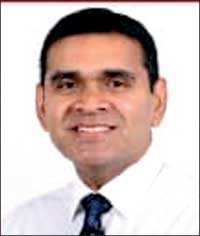Wednesday Feb 25, 2026
Wednesday Feb 25, 2026
Monday, 11 May 2020 00:28 - - {{hitsCtrl.values.hits}}
By Darshana Abayasingha
Sri Lanka will partially open up for local business and enterprise on 11th after nearly two months of closure and a plethora of challenges before it. The world and consumer landscape changed drastically over the past weeks despite lying dormant, and a great deal of effort is required by industry to charter a new course in this milieu.
Some of the biggest brands around the world have faulted or folded during this crisis, and as the pandemic forces businesses and nations to stay shut the future looks grim for many industries and employees.
 |
| CMEC Port City Head of Strategy and Business Development Thulci Aluwihare |
 |
| NDB Zephyr Partners Managing Director Senaka Kekiriwaragodage |
 |
| DEG Country Representative Geeth Balasuriya |
 |
| MAS Intimates Chief Executive Officer Rajiv Dharmendra |
 |
| Hela Clothing CEO Dilanka Jinadasa |
 |
| Brandix Group Finance Director Hasitha Premaratne
|
Here at home it is hard to envisage any sector that will be spared from change, and many brands that fought shy to embrace the digital revolution happening elsewhere scrambled to offer web-based solutions. This was one blessing in disguise, and a revelation (to some) that much of its employees could work from home instead of taking up space in offices and traffic.
These and many other aspects were points of discussion at a number of webinars hosted by PWC together with the Daily FT over the past fortnight.
One of the key aspects that came into spotlight during the discussions was if Sri Lankan businesses must be protected from foreign acquisitions, as some nations scurried to adopt protectionist measures in the wake of reports of aggressive takeovers.
NDB Zephyr Partners Managing Director Senaka Kekiriwaragodage opined that several safeguards were already in place; one being the restrictions over landownership with some sectors requiring investments in excess of $ 5 million to receive ownership.
With self-sufficiency fast becoming a hot topic globally, protecting domestic business would become important he said. However, Senaka also felt that agriculture is a sector that can do well with foreign investment as there is a need to enhance efficiency.
“Technology transfer is necessary in agriculture, so yields will go up which will be good for the country. Broad based removal of restrictions will be difficult given sensitivities, and there will be a genuine need to protect small businesses. But having some flexibility to some extent in strategic investments will be good. Another sector just like agriculture is pharmaceuticals, where we need some form of foreign collaboration. I still do not advocate broad-based lifting of restrictions.”
Joining the discussion was CMEC Port City Head of Strategy and Business Development Thulci Aluwihare, who naturally felt that any protectionist measures is counterproductive. However, he recognised that many countries in this region have restrictions on landownership by foreign entities.
“I personally think it is ridiculous for any foreign retail brand to come and invest $ 5 million as an investment to own 40%. It becomes a hard fight to attract foreign investment then, so protectionist measures don’t always help because there are other places in the region that are more attractive.
“So, Government would have to make bold unpopular decisions to fix some of this. The President’s Office has set up a task force representing all industries to set up an action plan to revive the economy. In the past too we have had these, so implementation is key to do well in this challenging environment,” Aluwihare averred.
With COVID-19 here to stay for the long-term, or so it appears, the question was raised as to what new opportunities or deals business must look at.
DEG Country Representative Geeth Balasuriya said that some people would still be reluctant to let go control of some part of the ship, despite the need for equity. He noted there are many instruments to raise equity without going to banks and the market must educate themselves on how to employ these effectively to overcome the situation. He felt that there are numerous opportunities for Sri Lankan businesses to raise capital and partner for the future.
“The most difficult thing would be how you come up with the forecast,” added Senaka. This would depend on the extent of recovery and the environment, and even if it does recover to what extent will it go back to normal.
Particularly, with foreign investment it will be important to target at least a certain benchmark in memory. In Sri Lanka, 95% of transactions are pure cash deals, and he felt it is time to bring in some exotic instruments into the market like debt to equity swaps. This is a good opportunity for the capital market to think vibrantly and bring in some new tools, he averred.
“The same appetite for investment will be there, however I hope there will be increased choice as this was a problem for equity investors in Sri Lanka for a long time. With this environment there maybe companies who didn’t want to dilute who may now consider this. However, you need to exercise more caution than earlier and look at the potential scenarios,” Senaka said.
Balasuriya predicted a period of cautious optimism from investors, adding that the market will be flexible and try accommodate deals that it previously would not have considered. The caution would be driven by macroeconomic fundamentals more than businesses itself, he stated.
Aluwihare then lent perspectives on the future of the Port City project. “The necessary legal framework for the Port City is already in place. With the proposed Special Economic Zone law what we are trying to do is position it more competitively to attract FDIs. We are hopeful that post-election the new law will be approved.
“We are still very optimistic. We have come forward with a commitment of a further $ 1 billion to invest in Port City on vertical development – that is really to instil confidence. The challenge is really to attract the first four or five investments to Port City, so we committed a further billion. Phase 1 is about $ 400 million. It all depends on how COVID-19 spans out,” he said.
Another discussion focused on the apparel sector and how some of Sri Lanka’s big names in the business are coping with the drastic changes brought on by COVID-19. It is evident that every apparel brand will have to remain competitive despite the different marketplace, and relook at the value propositions offered to customers. For instance, physical sampling will largely become a thing of the past with social distancing becoming the way forward. These would cause significant changes to the customer offering.
With a number of big-name manufacturers moving part of their operations to other parts of the region and Africa, travel restrictions have posed challenges to the operating model of some companies, but these have been overcome fast they assure. Hela Clothing CEO Dilanka Jinadasa revealed that the company had significantly empowered next levels to take on on-site decisions in order to keep operations running smoothly, as regular travel will be difficult for some time to come. However, he revealed that it has been noted that the level of interaction is much higher than before with video calls and working from home, a fact noted by many persons across numerous industries leveraging technology.
But with some of the world’s biggest fashion brands struggling even before the COVID-19 crisis broke, how will this new situation impact us? Brandix Group Finance Director Hasitha Premaratne shared his views.
“Even before COVID-19, we have gradually seen the retail model being challenged, despite a lot of resistance to change from the industry. COVID-19 will give a rapid push towards the transformation of the retail industry as a whole. The change and the amount of sales that was going through earlier was not the extent it could have been. “Now the retail reach will be mostly digital and this will be fast-tracked over the next few months and years. This scenario will bring permanent change in that sense, and we have to prepare for that and understand new channels. People will prefer working from home, so the type of product we sell will also differ and alongside that the supply chain response.”
“Then we will have new markets. Europe has been a preferred area due to preferred duty structures and established buyers. We will have to remodel our value proposition and ask the question how do we add value in this new world and probably look at expanding our customer base. After the COVID-19 case is over one day, we will have a very different profile of customer. We have to ask ourselves if we have a sustainable business model and we must be agile,” Premaratne said.
Joining the discussion was MAS Intimates Chief Executive Officer Rajiv Dharmendra, whilst commenting on value chains, credit periods and margins stated that the industry had not anticipated the scale of impact of the virus back in January or February. Whilst ecommerce businesses continue to thrive, those with a standalone store have been shut. He stressed the importance for manufacturers to ensure they extend possible support to customers to survive the current period – albeit for selfish reasons.
“The customers who have cash cover and have a plan, we are seeing how we can support them. But not everyone has that luxury. If you blindly extend credit lines which becomes a non-performing line then you are in serious trouble. So, ceilings are being put on as to how much you can give and such measures are being put in place. We are supporting our stakeholders as much as possible,” Dharmendra revealed.
A question was posed if there could be a shift in manufacturing plans by 2025, fuelled further by COVID-19. Jinadasa lent his perspective.
“Just to give context, the Hela Clothing just over three years ago less than 5% of revenue came from outside Sri Lanka. But last year almost 50% of revenue came from outside Sri Lanka. The growth for us is going to come from outside Sri Lanka.
“It boils down to the value proposition each country offers to the customer. The value proposition will become a larger piece of the solution from a brands perspective, as to who gets what allocation. Brands are forecasting orders to drop by 30% to 50%, so there will be consolidation and the pie becomes smaller.”
“Those who remain will have to really show why you should be getting this and Africa has certain value propositions which are very convincing. Costs, labour it is very competitive, it’s about one-fourth of what we incur here in Sri Lanka and then there is duty. That will be a significant deciding factor and Africa has some of the best regimes in the world; it’s a one-stop manufacturing destination and that offers benefits to stay relevant in a post-COVID-19 era.
“But we have to bring in complexities there, and now we may have to move them forward. How we can survive is we have to start thinking as entrepreneurs. We will have to evaluate which parts of the business makes sense and what are we going to use. With apparel companies acquiring technology companies to in-house knowledge, not only do you become cost-efficient you become faster because speed will become important in the future.”
Many local manufacturers have turned to making PPE to feed the growing global demand, and Premaratne averred that Sri Lanka must grab the chance as we have no choice due to significant drops in regular orders. He commended the pace at which bigger companies have responded to the surge in demand for PPE, adding that industry must take note of the speed its supply chains reacted to this sudden demand, and draw comparisons to its regular process of operations to improve efficiencies.
The first of the PWC and Daily FT webinars focused on the new tax regime introduced by Government and its impacts of employers and workers. With employees now having the opportunity to opt and out on payments over periods, MAS Holdings HR General Manager Dilani Perera observed that processes are already in place to serve this and that companies would not be in a position to stop that.
However, she noted that it is hoped employees would agree to make changes in a quarterly or bi-annual fashion whereby it would ease stress on the system. “I think this is a trial and test period, so we will have to do it and see but it is not going to be easy. Post-COVID-19 a lot of people will probably engage in other forms of employment, this new process could take care of increasing the taxes applicable,” she said.
Deducting tax regularly was much easier for all industry, it goes as part of routine process and we don’t have to worry about quarterly payments. Whilst the new system is still to be seen in practice, the negative impacts seem to be more. One of the biggest problems currently is how to get the January to April tax deductibles sorted out given the difficult situation at present. It appears many people will opt out for now.